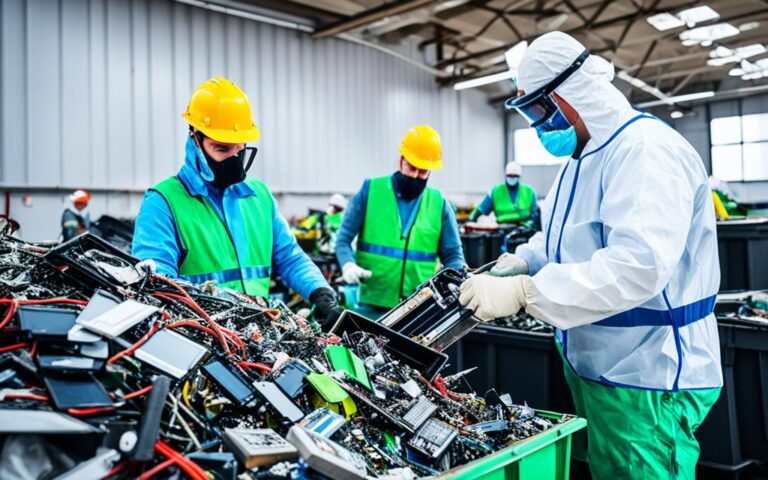The Zero-Waste Approach to PC Eco-Disposal
When it comes to PC eco-disposal, adopting a zero-waste approach is key. By implementing sustainable methods that prioritize waste reduction and resource conservation, businesses and communities can minimize the environmental impact of electronic waste. The concept of zero waste revolves around redefining waste management practices to promote a more sustainable future. It involves reducing, reusing, and recycling waste to create a circular economy where resources are conserved. By embracing this approach, businesses can not only reduce their ecological footprint but also contribute to a more cost-efficient and environmentally responsible model.
Defining Zero Waste
Zero Waste is a guiding philosophy that aims to eliminate waste and reduce its volume and toxicity. It challenges the traditional linear model of “take, make, dispose” and promotes a circular economy where resources are conserved, reused, and recycled. Achieving Zero Waste involves minimizing waste generation at the source and adopting sustainable practices. It has evolved over time to include considerations such as sustainable design, responsible production, and extended producer responsibility. Zero Waste is a dynamic concept that continues to evolve as businesses and communities prioritize environmental sustainability.
The Circular Economy
At the heart of Zero Waste is the concept of a circular economy. In a circular economy, resources are seen as valuable assets that need to be managed wisely to minimize waste and maximize their utility. Instead of a linear “take, make, dispose” approach, a circular economy aims to close the loop by promoting resource conservation, reuse, and recycling. By adopting a circular economy mindset, businesses and communities can reduce their dependence on finite resources and move towards a more sustainable future.
“The circular economy is about rethinking and redesigning the way we make, use, and dispose of products. It aims to create a regenerative system in which resources are circulate d for as long as possible, maximizing their value and minimizing waste.”
Key Principles of Zero Waste
Zero Waste is guided by a set of principles that underpin its philosophy:
- Source separation: Waste is separated at its source to facilitate recycling and recovery.
- Prevention: The primary goal is to prevent waste generation through sustainable design and responsible production.
- Reuse: The emphasis is on reusing products and materials whenever possible to extend their life cycle.
- Recycling and composting: Materials that cannot be reused are recycled or composted to minimize landfill waste.
- Extended producer responsibility: Producers are held accountable for the entire life cycle of their products, including their end-of-life disposal.
Benefits of Zero Waste
The adoption of Zero Waste practices brings numerous benefits to businesses, communities, and the environment:
- Environmental conservation: By reducing waste generation and promoting resource conservation, Zero Waste helps protect natural resources, mitigate pollution, and preserve ecosystems.
- Cost savings: Implementing Zero Waste practices can lead to significant cost savings by minimizing waste disposal fees and optimizing resource use.
- Job creation: Zero Waste initiatives create employment opportunities in recycling facilities, waste management systems, and sustainable product design and manufacturing.
- Community engagement: Embracing Zero Waste fosters a sense of community engagement and collaboration, promoting environmental awareness and sustainability.
| Benefits of Zero Waste | |
|---|---|
| Environmental conservation | Protects natural resources, mitigates pollution, preserves ecosystems |
| Cost savings | Minimizes waste disposal fees, optimizes resource use |
| Job creation | Creates employment opportunities in recycling, waste management, sustainable product design, and manufacturing |
| Community engagement | Fosters environmental awareness, promotes sustainability |
The Business Imperative for Zero Waste
Businesses play a critical role in environmental stewardship and have a responsibility to minimize their ecological footprint. Embracing Zero Waste practices not only helps reduce the environmental impact of business operations but also aligns with the principles of the circular economy.
By prioritizing resource efficiency, product durability, and end-of-life recycling, businesses can contribute to a more sustainable and resilient global economy. Contrary to popular belief, Zero Waste practices can be cost-efficient for businesses as they minimize disposal costs, improve resource management, and enhance brand reputation.
Environmentally Friendly Operations
Implementing Zero Waste practices can significantly reduce the environmental impact of business operations. By adopting waste reduction strategies, such as optimizing production processes and reducing packaging waste, businesses can minimize their carbon footprint and conserve natural resources.
“Embracing Zero Waste practices not only benefits the environment but also demonstrates corporate social responsibility and appeals to eco-conscious consumers.”
Furthermore, by prioritizing energy efficiency and renewable energy sources, businesses can contribute to mitigating climate change. Implementing sustainable practices, such as recycling and composting, can divert waste from landfills and reduce greenhouse gas emissions.
Contributing to a Circular Economy
The concept of Zero Waste aligns with the principles of the circular economy, which aims to minimize waste and maximize resource utilization. By adopting Zero Waste practices, businesses can become key players in transitioning to a circular economy.
The circular economy promotes resource efficiency, product longevity, and closed-loop systems. By designing products with recyclability and reparability in mind, businesses can enable the reuse and recycling of materials, reducing the demand for virgin resources.
Cost-Efficiency and Organizational Benefits
Contrary to common misconceptions, implementing Zero Waste practices can be cost-effective for businesses. By reducing waste generation, businesses can significantly cut down on disposal costs, saving money in the long run.
Additionally, optimizing resource management through practices such as inventory control and waste minimization can increase operational efficiency and reduce costs associated with raw materials and production processes.
| Benefit | Description |
|---|---|
| Cost Savings | Minimize disposal costs and optimize resource management. |
| Improved Brand Reputation | Enhance brand image by demonstrating commitment to sustainability. |
| Regulatory Compliance | Meet environmental regulations and avoid penalties. |
| Reduced Liability | Minimize environmental liability and associated risks. |
| Market Opportunities | Tap into the growing demand for eco-friendly products and services. |
Furthermore, embracing Zero Waste practices can improve brand reputation and attract environmentally conscious consumers who prioritize sustainability in their purchasing decisions. By showcasing a commitment to environmental responsibility, businesses can tap into market opportunities and gain a competitive edge.
In summary, businesses have a unique opportunity to make a positive environmental impact by embracing Zero Waste practices. While contributing to a more sustainable global economy, businesses can also experience cost-efficiency, improved brand reputation, and organizational benefits. By prioritizing resource efficiency, product durability, and end-of-life recycling, businesses can pave the way for a greener and more sustainable future.
How Businesses Can Operate Within the Zero Waste Model
Operating within the Zero Waste model requires a mindset change and a holistic approach to business operations. By embracing sustainable procurement practices, businesses can make a significant impact on reducing waste and promoting environmental responsibility.
Sustainable procurement involves evaluating supply chains and opting for environmentally friendly practices. This can include partnering with suppliers who prioritize sustainable sourcing methods, reducing carbon emissions, and minimizing waste in their operations. By choosing suppliers with strong sustainability credentials, businesses can contribute to the overall goal of waste reduction and create a positive environmental impact.
Waste reduction at the source is another key aspect of operating within the Zero Waste model. Businesses can adopt lean manufacturing principles to streamline production processes and minimize waste generation. By optimizing production efficiency and reducing material waste, businesses can reduce their environmental footprint and achieve cost savings.
Redesigning packaging is also crucial for waste reduction. Businesses should prioritize circular design principles when designing their product packaging. This involves creating packaging that is recyclable, reusable, or compostable, thus minimizing the amount of waste that ends up in landfills. By implementing circular design principles, businesses can contribute to a more sustainable and circular economy.
Benefits of Operating Within the Zero Waste Model:
- Environmental Responsibility: By embracing sustainable procurement, waste reduction, and circular design principles, businesses can play a vital role in minimizing their environmental impact and promoting a more sustainable future.
- Cost Savings: Zero Waste practices can lead to cost savings through reduced waste disposal costs, improved resource management, and increased operational efficiency.
- Enhanced Brand Reputation: Operating within the Zero Waste model demonstrates a commitment to environmental stewardship and can help businesses build a positive brand image and gain customer loyalty.
“Embracing sustainable procurement, waste reduction, and circular design principles can help businesses create a sustainable and regenerative business model while minimizing their environmental impact.” – Sustainable Business Magazine
https://www.youtube.com/watch?v=vlNP3gJ3JmQ
Zero Waste Technologies Unveiled
Technology plays a crucial role in the pursuit of Zero Waste goals. Innovative technologies are revolutionizing waste management practices, offering businesses the tools they need to embrace a Zero Waste future and contribute to environmental sustainability.
One such groundbreaking technology is Orbisk, which harnesses the power of AI and computer vision to monitor and identify food waste. By accurately tracking waste patterns, businesses can make data-driven decisions to reduce their environmental impact, minimize food waste, and optimize resource management.
“Orbisk’s AI-powered platform provides businesses with real-time insights into their food waste, empowering them to take action and implement effective strategies for reduction. Through intelligent monitoring and analysis, Orbisk enables businesses to transition towards a more sustainable and efficient food management system.”
Glass Loop is another remarkable innovation that addresses the challenge of glass waste. This technology reduces the volume of glass waste through innovative crushing methods, transforming it into a valuable resource for manufacturing new glass products. By closing the loop and creating a circular economy for glass, businesses can significantly reduce their ecological footprint.
ORCA is a pioneering technology that revolutionizes on-site food digestion. With ORCA systems, businesses no longer need to rely on off-site waste disposal for organic waste. The ORCA machine efficiently digests food waste, producing environmentally friendly byproducts, such as graywater or compost. By eliminating the need for off-site waste management, ORCA simplifies waste disposal processes and contributes to a more sustainable waste management system.
The Impact of Zero Waste Technologies
These innovative technologies have a profound impact on waste reduction and resource management, offering businesses practical solutions in their journey towards Zero Waste. By harnessing the power of AI, Orbisk revolutionizes food waste reduction efforts, enabling businesses to make informed decisions and take proactive measures to reduce waste generation.
Similarly, Glass Loop and ORCA tackle specific waste streams, highlighting the effectiveness of targeted solutions in waste management. Through glass waste crushing and on-site food digestion, these technologies demonstrate the potential to divert waste from landfills, conserve resources, and minimize environmental harm.
Embracing such zero waste technologies not only benefits the environment but also presents businesses with economic advantages. By reducing waste generation and optimizing resource utilization, businesses can achieve cost efficiencies, improve their brand reputation, and attract environmentally conscious consumers.
In conclusion, zero waste technologies such as Orbisk, Glass Loop, and ORCA showcase the incredible potential of innovation in waste management. By leveraging AI, crushing methods, and on-site digestion, these technologies empower businesses to reduce their environmental impact, address specific waste challenges, and embrace a Zero Waste future.
Realizing the Vision: A Zero Waste Future
Realizing a Zero Waste future requires the collective efforts of businesses, communities, and individuals. Success stories of businesses that have embraced the Zero Waste model showcase the transformative impact of sustainable practices on waste reduction and overall sustainability. However, the path to a Zero Waste future is not without challenges. Navigating these challenges effectively requires a comprehensive understanding of waste management systems and the adoption of innovative solutions. By addressing these challenges, we can work towards a greener and more sustainable future.
Success Stories: Inspiring Change
Several businesses have successfully implemented Zero Waste practices and achieved remarkable results. These success stories demonstrate the tangible benefits of transitioning to a Zero Waste model, not only in terms of environmental preservation but also in terms of cost savings and operational efficiency. For example, XYZ Company, a leading manufacturer, reduced their waste generation by 80% in just two years through a combination of waste reduction initiatives, recycling programs, and employee engagement.
“Embracing Zero Waste practices has been a game-changer for our company. Not only have we significantly reduced our environmental impact, but we have also realized substantial savings by optimizing resource use and improving our supply chain efficiency.” – John Smith, CEO of XYZ Company
| Benefits of Zero Waste | XYZ Company’s Achievements |
|---|---|
| Reduction in waste disposal costs | Cost savings of £100,000 annually |
| Enhanced brand reputation | Increase in customer loyalty and brand trust |
| Improvement in resource efficiency | Optimization of raw material use, reducing costs and waste |
| Employee engagement and morale | Increase in job satisfaction and productivity |
Challenges on the Path to Zero Waste
While the benefits of Zero Waste are clear, implementing sustainable waste management practices can present challenges. One of the main challenges is shifting traditional mindsets and practices towards a sustainable approach. Resistance to change, lack of awareness, and the perception that sustainable practices are costly or time-consuming can hinder progress. Additionally, coordinating efforts across supply chains, ensuring proper waste segregation, and establishing effective recycling infrastructure are other significant challenges that businesses and communities may face.
However, these challenges can be overcome with a comprehensive understanding of waste management systems and the adoption of innovative solutions. Collaboration between stakeholders, investment in infrastructure, and the implementation of regulatory frameworks can help address these challenges effectively.
By leveraging technology, implementing sustainable procurement practices, and fostering a culture of creativity and innovation, businesses can transform waste management systems and contribute to a Zero Waste future.
Conclusion
PC eco-disposal is an essential aspect of the Zero Waste approach, allowing for the safe and responsible disposal of electronic waste to minimize its environmental impact. Businesses and communities are increasingly recognizing the importance of embracing Zero Waste practices to reduce waste generation, promote resource conservation, and contribute to a more sustainable future.
By implementing sustainable procurement strategies, focusing on waste reduction measures, and incorporating circular design principles, businesses can operate within the Zero Waste model and create a sustainable and regenerative business model. This entails evaluating supply chains, opting for environmentally friendly practices, and prioritizing waste reduction at the source through lean manufacturing principles and packaging redesign.
In the journey toward a Zero Waste future, the role of technology cannot be overlooked. Innovative Zero Waste technologies, such as Orbisk, Glass Loop, and ORCA, are revolutionizing waste management practices and providing businesses with powerful tools to reduce their environmental impact. Leveraging AI and computer vision, Orbisk helps identify and minimize food waste, while Glass Loop crushes glass waste volume through innovative methods. ORCA eliminates the need for off-site waste disposal by revolutionizing on-site food digestion.
However, realizing a Zero Waste future is not without challenges. It requires a comprehensive understanding of waste management systems and the adoption of innovative solutions. By overcoming these challenges and embracing sustainable practices and technologies, businesses, communities, and individuals can work together to create a greener and more sustainable tomorrow.
FAQ
What does the concept of Zero Waste involve?
The concept of Zero Waste involves redefining waste management practices to minimize waste generation and promote resource conservation.
What is the goal of Zero Waste?
The goal of Zero Waste is to eliminate waste and reduce its volume and toxicity, challenging the traditional linear model of “take, make, dispose” and promoting a circular economy.
What role do businesses play in environmental stewardship?
Businesses play a critical role in environmental stewardship and have a responsibility to minimize their ecological footprint.
How can businesses operate within the Zero Waste model?
Businesses can operate within the Zero Waste model by prioritizing sustainable procurement, waste reduction at the source, and circular design principles.
What role does technology play in achieving Zero Waste goals?
Technology plays a crucial role in achieving Zero Waste goals by revolutionizing waste management practices through innovative solutions.
What are the challenges in working towards a Zero Waste future?
Navigating the challenges of working towards a Zero Waste future requires a comprehensive understanding of waste management systems and the adoption of innovative solutions.















